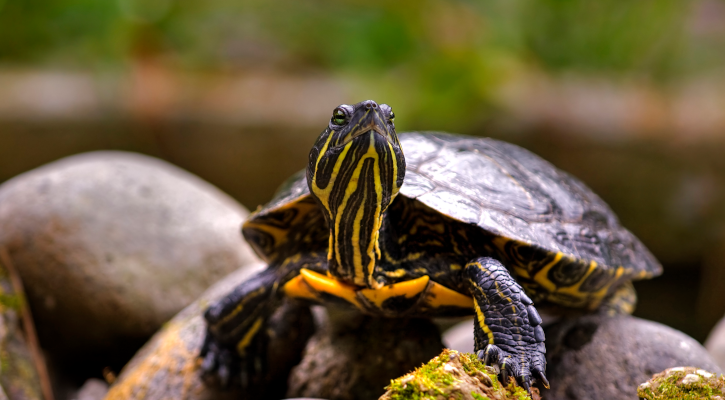|

Reptile and Amphibian Wellness
90% of reptile and amphibian medicine is prevention. If we are able to provide proper nutrition and husbandry for our exotic companions from the start, many can live long healthy lives. While there are many resources on the web, finding the correct information can be challenging. Your initial wellness exam will help guide you to becoming the best reptilian keeper you can be.
Reptile and Amphibian Routine Wellness:
- A Complete Physical Exam
- A Complete Nutrition and Husbandry Review
- Guide to Finding the Best Information on the Web (if you like doing your own research)
- Guide to Cultivating Your Own Insects (if you like that sort of thing)
- Strategies For Success with Husbandry
- Fecal Screenings
- Oral examination, and
- Body condition scoring.
Consultation cost for reptiles and amphibians is $144 (subject to change). A non-refundable deposit equal to your consultation cost is required to make an appointment for all new patients and is applied to your consultation cost at the time of the appointment. Click REQUEST APPOINTMENT and follow prompts OR call to make deposit and request consultation at 507-361-3088
It is important to note that there are Zoonotic Diseases (Diseases that can Affect Human Beings) Associated with Reptiles & Amphibians
This sections provides information on various diseases that can be passed from aquatic, semi-aquatic and terrestrial reptiles and amphibians to people. The zoonotic diseases associated with reptile and amphibian contact are primarily bacterial infections. These include Salmonella, Mycobacterium, Campylobacter, Aeromonas, Escherichia coli, Klebsiella, Serratia and Flavobacterium meningosepticum. Often these infections do not make animals appear ill but can cause serious illness in humans. Persons with specific medical conditions such as a chronic illness, immunodeficiency and pregnancy may be at higher risk of developing disease or complications from a zoonotic disease and should consult with their physician before working with animals. Additional information on zoonotic diseases can be found on the Center for Disease Control and Prevention Website, Healthy Pets, Healthy People.
Any reptile or amphibian may be infected with Salmonella. Clinical symptoms of salmonellosis in reptiles and amphibians can include lack of appetite, diarrhea and lethargy but many animals may be infected carriers and show no symptoms at all. Humans acquire the infection via poor hygiene and accidental ingestion of contaminated feces, water or other contaminated materials. Infected humans can develop fever, abdominal cramps, diarrhea with or without blood and less commonly arthritis, pneumonia and septicemia. More severe illness is likely to occur in susceptible people such as children under 5, the elderly, and people who have lowered natural resistance to disease due to pregnancy, cancer, chemotherapy, organ transplants, diabetes, liver problems or other diseases.
Reptiles and amphibians can carry various atypical Mycobacterium species including Mycobacterium marinum, M. fortuitum and M. chelonae. All can be associated with acute or chronic disease, but many animals are long-term carriers before clinical disease is detected. If any carries show any signs of disease, these can be in the form of skin lesions or deformed bones. People acquire these bacteria via contact with contaminated water or infected animals. Persons infected with mycobacteriosis may develop “fish tank granulomas” which appear as skin ulcers or nodules usually on the hands. Immunosuppressed persons can develop lymphadenitis & pulmonary disease similar to tuberculosis or more severe disseminated disease.
Campylobacter, Aeromonas, Edwardsiella, Escherichia coli, Klebsiella, Serratia and Flavobacterium meningosepticum and other bacteria are pathogens which may be transmitted by contact with abraded skin or wounds or accidental ingestion of feces, contaminated water or other materials. In animals, the disease may present as discoloration of the limbs (amphibians). Contact may result in wound infections and ingestion can result in gastroenteritis with vomiting and diarrhea. More severe & potentially life-threatening disease and septicemia may occur in immunosuppressed persons.
Transmission of zoonotic diseases from animals is primarily by direct contact, indirect contact with insect vectors and contaminated inanimate objects, oral ingestion or inhalation of aerosolized materials.
We can protect ourselves from most diseases by using the following basic hygiene procedures:
- Do not eat, drink, apply cosmetics or use tobacco products while handling animals or in animal housing areas.
- Wear eye protection when appropriate.
- Handle animals safely to prevent bites or scratches. Thoroughly wash any wounds and report injuries.
- Cover abraded skin, cuts, scrapes or sores and do not allow wound contact with animals, animal contaminated materials or aquarium water. Persons with infected wounds indicated by swelling, redness, pain and draining fluids with or without a fever should seek medical treatment.
- Keep animal areas clean. Use cleaning techniques that do not aerosolize contaminated water or other materials.
- Most importantly, familiarize yourself about the animals that you will keeping and the potential zoonotic diseases associated with each species. If at any time, you suspect that you have acquired a zoonotic disease, seek medical care from your family doctor.
|
|
Get in Touch
 Email Us! Email Us!
50 45th AVE Southwest
Rochester, MN 55902

|
|
|
|
|